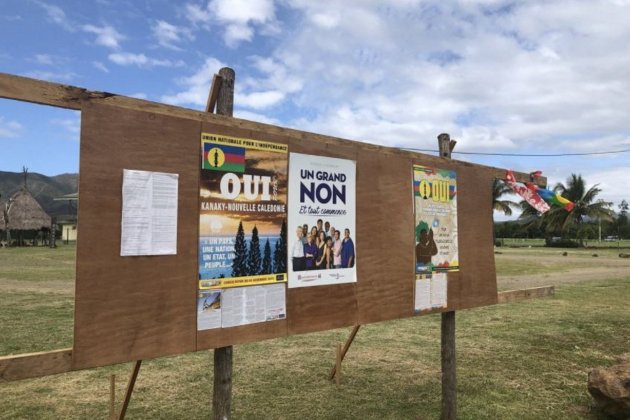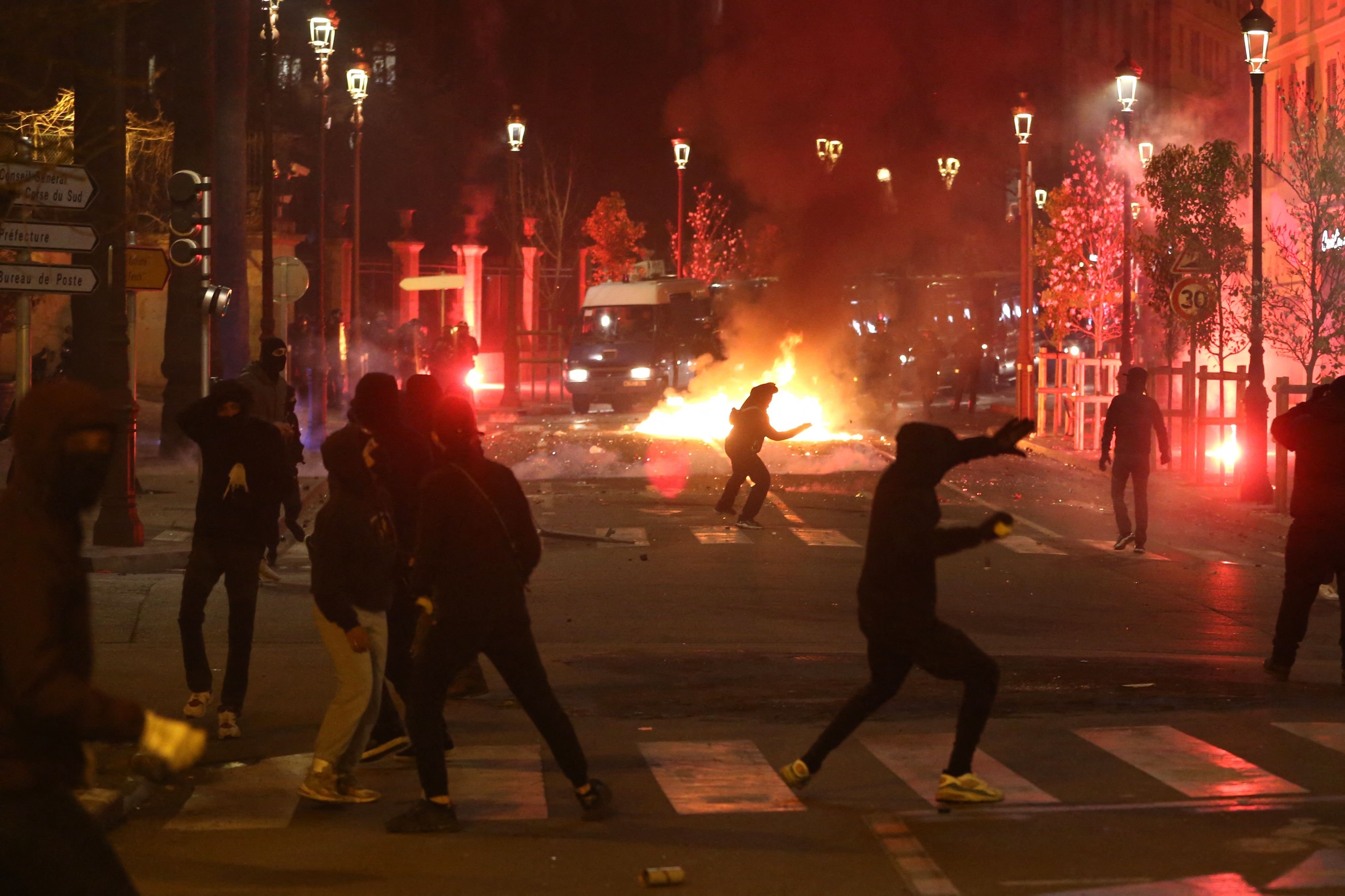He had always denied the allegations against him. But, imprisoned, he asked repeatedly for, at least, compliance with prison legislation: that he be transferred to a prison close to his home, on the island of Corsica. But this was systematically denied, with security reasons cited. As a result, he remained in solitary confinement in Arles, a high-security prison. High security that did not, however, prevent a brutal eight-minute assault from being inflicted on him by another inmate, in this case a jihadist, without any camera apparently detecting it. The beating ended with him in a coma in a Marseille hospital. Three weeks later, Corsican pro-independence prisoner Yvan Colonna, convicted of the 1998 assassination attempt on the prefect Claude Erignac, died. It was March 21st this year.
The streets erupted in flames as soon as Colonna was hospitalized. Mass demonstrations were held for days, until his funeral, but there were also riots. The rain of Molotov cocktails left dozens and dozens injured: in just one night in the Corsican capital of Bastia, on March 13th, about sixty were hurt.
It all blew up in the face of president Emmanuel Macron, in the middle of the presidential election pre-campaign, after a whole term promising a dialogue that had never arrived, postponed from the Élysée palace. And it forced him to make a move. The demand for prisoner transfers was indeed one of the main demands of Corsican nationalism, which governs on the island. Central government has already expressed its desire to speed up the process of bringing prisoners back to the island. The Élysée has also expressed its intention to negotiate more autonomy. "The government has listened to the demands of the representatives of Corsica on the institutional, economic, social and cultural future," the interior minister said in a statement. It remains to be seen what happens with the co-official status of the Corsican language, the third part of the nationalist claims.
For Paris to react, everything had to blow up. The tragic law of French politics since the country beheaded its kings: it is violence that makes things move. And the fact is that in the face of Macron's motionlessness for five years, Corsican nationalism has only strengthened. In the 2015 regional elections, Corsican-based parties, between those wanting more autonomy and those calling outright for independence, accounted for 35% of the vote. In December 2017, a few months after the current president came to the Élysée, they won 56% of votes in the regional elections. As of June 2021, they were already at 68%. In six years, they have almost doubled. And the riots are still going on.
Constitutionalist Michel Verpeaux, professor emeritus at the Sorbonne, says that in Corsica, a problem has long existed, and Colonna's death only added "more fuel to the fire." It is difficult to find a way for the island to fit into France, having had different specific autonomy statutes that "have not gone very far". And there has also been inattention from Paris. "The president hasn't been very interested, he wasn't concerned, until everything exploded," said Verpeaux. There was even procrastination. As an example, a bill to move Corsica towards autonomy was registered, but was never debated in the National Assembly.
The Sorbonne professor emeritus recalls that Corsica is not the only case, and that for decades there have been territories that seek to "differentiate themselves" legally and that the French state is carry around "problems" and "situations that are difficult to manage”.
Another explosive cocktail also exploded in recent months. It was on the Carribean islands of Guadeloupe and Martinique, French colonies since the seventeenth century, before the revolution that beheaded the kings. The trigger was the introduction of mandatory vaccines for health personnel and the Covid pass. But the reasons for the revolt were much deeper and came from way back. Up to 90% of the population were contaminated with chlordecone, a highly toxic insecticide, which can cause cancer, used on banana plantations between the 1970s and 1990s. Since then, there has been a deep distrust of the state. Covid-19 was the last straw: the vaccine requirements came on top of a lack of public services, rises in fuel prices, youth unemployment and rises in the cost of living.
There were three months of protests, a general strike, looting and riots in the streets between November 2021 and January 2022. They left one person dead in a car accident and 63 police officers injured - seven of them with gunshot wounds - and dozens of protesters arrested. According to prosecutors, there were organized groups behind the riots.
The events also caught the Élysée off-balance and forced some rapid footwork. The French government immediately overturned the controversial health measures in the islands and the overseas territories minister, Sébastien Lecornu, flew to the Antilles in an attempt to calm the situation. And discussion was opened on the granting of autonomy in Guadeloupe and Martinique. "Autonomy already exists in the Republic. French Polynesia and New Caledonia are autonomous countries. Autonomy is decentralization taken to the extreme. Why should it be bad?" he argued in an interview. Promises that, for the time being, have not gone any further.
New Caledonia, island group in the south-west Pacific that has been part of France since the first half of the 19th century, burst into flame in the 1970s. A first attempt at an unsecured referendum brought the islands to the brink of civil war in the mid 80s. Pro-independence and loyalist forces clashed in the streets, with a death toll of 21, most of them among the ranks of the indigenous Kanaks. The episode ended first with the Matignon agreements and then with the Nouméa Accord, which established the transfer of most powers (except defence, foreign policy, public order, justice and currency) to the island government, and the holding of three independence referendums. Three decades later, though, the dispute remains unresolved. New Caledonia still remains on the UN's list of territories pending self-determination.
In fact, New Caledonia is currently at an impasse. Support for independence grew from one referendum rto the next. In the first consultation, in November 2018, 43.3% of the votes favoured independence, with a turnout of 81%. In the second, in October 2020, the 'yes' vote was up to 46.7%, with 85.7% participation. But in the third and final vote, last December, there was a twist in the plot: 96% of voters favoured 'no'. The key was that the turnout was less than 40%. The pro-independence side actively boycotted the vote, because, after coronavirus had hit hard in the three months before the proposed date, they alleged that a proper campaign and a fair referendum were impossible. They even went to the UN, but no one moved a finger. This did not stop president Emmanuel Macron from congratulating himself on the victory of French unionism. But the independence movement does not accept the verdict and calls for a new referendum. New Caledonia is in an uncertain and flammable situation.

The language issue
While language has not been responsible for literal flames, it was fueled the figurative fires. The French Constitution, in its second article, makes it clear that "the language of the Republic is French." But there are many other tongues spoken in France, starting with Catalan and Basque in the south and continuing with Corsican, Breton, Occitan, Franco-Provençal, Western Flemish, the Oïl languages, Luxembourgish... And it is not until Article 75 of the Constitution that it states, in general, that "regional languages are part of the heritage of France". One language comes first, French, and then everything else. A legacy of Jacobinism that has had consequences: according to Catalan group Plataforma de la Llengua, Northern Catalonia is the territory in all of the Catalan-speaking lands where Catalan is spoken least - among 5.7% of the population. And an inheritance that has tightened the pressure to the maximum.
The metaphorical fire reached the streets of Perpignan, Corsica, Toulouse, Montpellier, Lille and dozens of cities on May 30th. Protesters got onto the streets to demand the protection of linguistic diversity after a new frustration: the undermining of the Molac Law. This new language reform was propelled by Breton MP Paul Molac from within the ranks of Emmanuel Macron's party - opening the door to language immersion in regional languages, based on 50% of classroom time - and it was passed by the National Assembly. But sixty Macronist deputies then took it to the Constitutional Court, which ended up overturning it in record time and endangering private initiatives such as La Bressola, a Catalan-language school in Northern Catalonia.
It was this that caused thousands of French people to take to the streets to protest. And again Emmanuel Macron made a move in response. Five days after the devastating court ruling, the president of the Republic proclaimed that "the languages of France are a national treasure", acknowledged the work of associations such as La Bressola and assured that "the right has to liberate ... it must never suffocate". Fine words that, for now, have not translated into anything tangible. And not for the first time.
Beyond the particular cases, the constitutionalist Michel Verpeaux recalls that France is a "very unitary" state, unlike its neighbour beyond the Pyrenees, where language issues are also fiery. French unity has led to multiple problems in recognizing its territorial diversity, both in the metropolis and overseas. There have been timid attempts at decentralization since the 1990s. But Verpeaux notes that political majorities are required in order for these moves to bear fruit: "There are parties that are very cold on decentralization. The far right is like this, and so is the far left. There is only the centre. It will all depend on them". That is why he does not dare to take out a crystal ball and say whether the mists will clear to allow decentralization.

